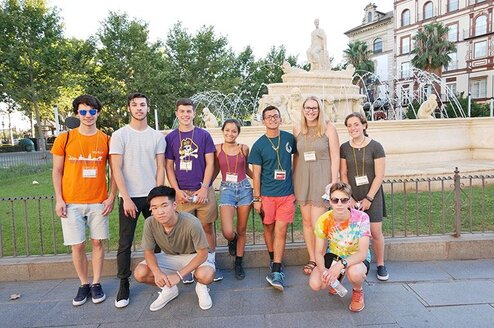High School Study Abroad in Spain
High School Study Abroad Programs in Spain
Pagination
About
So you're thinking about studying abroad in Spain? Good for you! Spain is a vibrant country with a rich and diverse culture and history. There are various regions around Spain with distinct atmospheres and characteristics that all offer incredible experiences for students interested in studying abroad.
Spanish is one of the most popular languages in the world with almost 406 million speakers. It is the official language of 21 countries, making it the second largest language (behind Chinese) in terms of first-language speakers, and is widely spoken in 44 countries. To be clear, there are more native Spanish speakers than native English speakers. In this continuously more interconnected world, an international experience and skills in a second language are attributes that you can use for the rest of your life.
Why not take advantage of this invaluable opportunity to get a taste of a new culture and immerse yourself in one of the most popular languages in the world?
Highlights
- Language: Spanish. Surprise! If you're planning on studying abroad in Spain, chances are you will be learning Spanish, but there are also other regional dialects you may encounter.
- Cost of Living: Some of the most popular cities are Madrid, Barcelona, Sevilla, and Granada, each with their own unique culture and history.
- Activities: Costs of programs vary and depend on length and location: semester-long programs usually range between $9,000-$10,500, while some summer programs are roughly $1,000-$2,000 per week.
- Fun Fact: Christopher Columbus's remains are in a tomb in Sevilla, Spain; however, the Dominican Republic also claims to be guarding the remains of Columbus.
Program Types
There are quite a few different types of programs to study abroad in Spain and countless organizations that offer them. Depending on the amount of time you have, your Spanish proficiency, level of adventure, economic means, and all around situation, your chosen program will affect the type of experience you have. Rest assured, though, each and every one of them has the potential to be an incredible, life-changing, and unquestionably memorable experience.
One of the most popular types of programs for high school students is spending a semester or school year with a Spanish host family and attending a Spanish high school. This is basically like going to high school in the US and taking the normal set of required high school courses except, oh yeah, you'll be studying in Spain, with local students, most likely in Spanish.
If you'd like to start your adventure towards global citizenship with a shorter, usually summer, study abroad experience in Spain, there are plenty of these programs available as well. They often last from a couple of weeks to a month. Depending on if you go by yourself or with a group, you may stay in one specific town or city in Spain with a host family and/or tour various places in the country.
Planning Your Trip
Now, clearly spending time in a foreign country is a big step, so it's best to think things through and figure out what type of program best suits you before you jump into anything. A simple web-search or perusal of Go Overseas will give you tons of information about specific programs and organizations. Most importantly though, you need to be heading into this experience with an open-mind and a sense of adventure.
It's really important to discuss your options with your parents. Chances are, they'll have their own set of concerns, so you'll want to be armed with all of the information you've already found out to demonstrate the maturity that's going to serve you so well in Spain. Some of the most important things to consider is how this is going to affect (if at all) your timeline and requirements for graduation from your high school in the US, and how you intend to fund your vida en España.
Requirements:
The requirements for studying abroad are going to vary depending on the specific type of program and organization. If your current high school is affiliated with a particular study abroad/foreign exchange organization, those are the requirements you'll need to be working under. Other organizations have different requirements to keep in mind as well. Nevertheless, there are a lot of general requirements that go along with most programs that are often essential for acceptance into these programs, and these are usually made pretty apparent in the early stages of the application process.
Most programs are looking for at least two years of high school Spanish. This may not be a requirement for some of the shorter programs, but if you plan to stay with a host family, not to mention take classes in a Spanish high school, you're going to want to have a few grammatical bases covered before you go. Obviously you're going to be learning a ton more when you get there, but you'll want a basic level of Spanish first.
Another obvious requirement is being of "high school age" (typically 14-18 years old or a young 19). There are some other programs that are designed for a “Gap Year” between high school and college that may also suit you, and these sometimes even offer college credit.
To demonstrate that you'll be up for the academic challenge, most programs have a minimum Grade Point Average (GPA) requirement of around 2.5 or 2.75 on a 4.0 scale. A critical point for most application processes is your ability to demonstrate maturity, flexibility, and a genuine interest in the language, country, and people of Spain.
Depending on what type of program you’re interested in and your current high school, there could be additional requirements regarding prior classes you’ve taken and your eligibility.
Housing/Accommodations
Like mentioned above, this really does depend on your chosen program. However, most programs, even a lot of summer programs, are designed to have participants live with host families. These are Spanish families from the area, quite often with kids of their own, that will welcome you into their home as a way to provide the most authentic experience of a typical Spanish teen.
Just as importantly, host families are the best way to drastically increase your Spanish-speaking ability in the shortest amount of time. As an added perk (as if getting to live in Spain wasn't enough), most host families are also responsible for providing you with all of your meals and other basics like laundry as a part of the program fees.
It may seem daunting to consider living with a strange family, but this is also a great way to curb any potential homesickness. Many students find that their host families ended up being one of the best parts of their overseas experience and develop lifelong friendships with their host families.
Rest assured: the program provider selects these families with great discretion, specific matches between families and students are made, and many families have hosted other students in the past. This is a great way to become fully immersed in Spanish life and to have the most authentic experience. Program providers also keep in close touch with students throughout the duration of programs, and are willing and able to make rearrangements for students should a need arise.
The important thing to keep in mind is that these families are not going to be the exact same as your family at home. But that's the whole point! This is a growing experience and a rare chance to experience living with a new family across the world. Embrace the differences and be prepared and excited to share your varying cultures with each other.
Preparation
Apply for a passport as soon as possible because these can sometimes take a while to process. If you already have a passport, make sure that it does not expire within three months of the date you plan to return to the US. If you plan to stay in Spain for longer than 90 days, you must also apply for a student visa from the nearest Spanish Embassy. More information on this, as well as specific embassy information can be found on the US Department of State's website. Many study abroad program advisers offer assistance in figuring out the logistics of the application process. It's also a good idea to check in with your doctor before you go to make sure all of your regular immunizations are up to date.
Financial Costs
The cost of living and program prices completely depends on how long your program is and what organization you choose to go through. On average, programs typically offer a semester-long program from about $9,000-$10,500 per semester, which includes the major components like room, board, and classes. Depending on the program, some prices also include things like round-trip airfare to Spain, various excursions, and/or medical insurance.
Shorter programs tend to run about $1,000-$2,000 per week, depending on the program and may or may not include the cost of airfare. Some programs allow you to add on additional weeks at a cheaper price than the minimum length of the program. For various other purchases, or in case of emergency, it is also recommended to have a few hundred extra dollars per month available through something like a credit or debit/ATM card.
Take a deep breath. There are ways to help lower the cost of your program. First, some program providers offer scholarships to apply for after signing up with them. There are many scholarship organizations out there, as well as some government-sponsored programs that have countless scholarships available for students just like you. Don't forget to check into scholarship opportunities from your current high school or local organizations in your community. Some scholarships and grants are need-based, while others are merit-based or contingent on your particular type of program.
Keep in mind: the more things you apply for, the better your chances of getting outside funding. Many students also utilize fundraising to help raise money for their experience. This is an especially good idea if your program is going to be volunteer-based because people love to support a good cause.
The best thing to keep in mind is to plan early, create a budget, and try to save money before you go. Trust us: it will be worth it!
Why study abroad in Spain in high school?
Most people associate studying abroad as something that's done in college. True. But why not in high school? If you go to Spain now, that just leaves that much more time to return to visit your new favorite host family in a few years or to go study in a different country when you're in college.
It's no joke how expensive college is getting these days, so why not give yourself that competitive edge to help when applying to your dream school or for the scholarships that everybody is dying to get? Colleges and future employers alike scramble for people who have study abroad experience because of what it says about those individuals strong (and not to mention awesome) enough to take the leap of faith and venture into the unknown.
Studying abroad shows that you're mature, flexible, intelligent, and an independent mind. Studying in Spain demonstrates that you have acquired language skills in the second biggest language in the world, making you a hot commodity, particularly if you're thinking about majoring in Spanish in college. Even if you're not, Spanish skills are beneficial in virtually any career field that your little heart may desire.
Setting aside all of that, think about yourself. There is no doubt that you will grow from an experience in Spain. Not only will you have a ton of fun, but you'll also gain a much more worldly perspective about the United States and new regions of the world. You will be surprised about how much you have learned about yourself and what you're capable of. Chances are, you'll have a better idea about what kind of career path you may want to pursue in college, or at least have the confidence to know that you can excel in whatever you may choose.
Why study abroad in Spain in high school? A better question to ask yourself would be why not? As one of the most popular languages in the world, there is no limit to the ways in which Spanish skills can come in handy in the future. And there's no telling what new path this international experience may take you down. So take the leap of faith and seriously explore your options to see if studying in this pleasant peninsula of the European Union is right for you!













